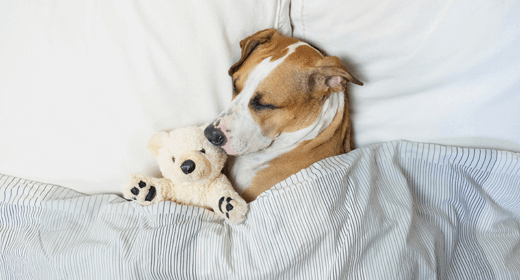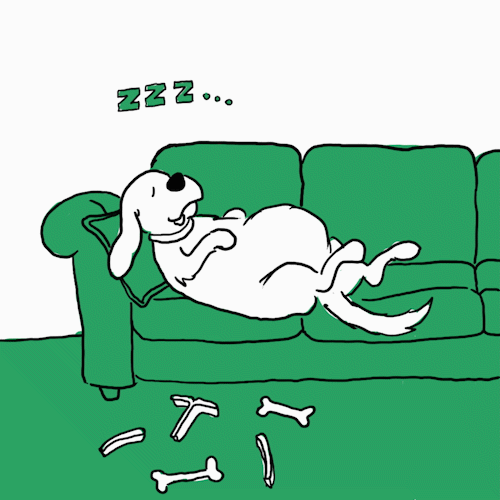

We may often envy our dogs for the kind of life they lead. Chilled, relaxed, and always well-rested. After sleeping like babies all night, dogs have the ability to nap throughout the day. You will find them basking under the sun, dozing off on the couch, or just napping next to your feet. When they do wake up after they’ve had their fat naps, they are full of energy and ready for some serious playtime.
Many animals, like dogs, sleep differently than we humans do. This is a very common reason for dog parents to wonder why my dog is always sleeping. Is my dog sleeping a lot or not enough? If you are wondering how much sleep do dogs need, there is more than one answer to this question. Just like how our sleep cycles change throughout our lives depending on our age, health, lifestyle, etc, a dog’s sleep cycle also changes depending on its age, health, and lifestyle. Keep reading to learn more about how long do dogs sleep, so it’s easier for you to understand your floof’s sleep patterns.
Dogs need a considerable amount of sleep; a lot more than we do. Additionally, carnivores like dogs sleep a lot more than herbivores since sleep is more dangerous for prey animals. The total number of hours a dog needs to sleep for varies on different factors such as its age, its health condition, and the kind of life it leads. Out of all these factors, age matters the most.
Dogs can sleep for around 12-14 hours each day, but puppies can clock in even more hours. This is because the body needs a lot of rest and repair during the first few months of life. Let’s take a look at how age affects the sleep cycle of dogs.
Puppies need to sleep for as long as their body needs to facilitate growth and repair. It is completely normal if your puppy sleeps for most of the day. In fact, puppies tend to sleep more throughout the day and less through the night.
Most adult dogs tend to sleep for anywhere between 8 to 13 hours, averaging around 11 hours each day. Yes, that’s a lot but that’s also a charm for these cute, cuddly floofs. Adult dogs tend to sleep for longer during the night depending on their and their pet parent’s schedule. However, napping for them is equally important. That being said, sleeping for a few hours during the day is absolutely normal.
Senior dogs and middle-aged dogs sleep as much as puppies. They tend to not wake up through the night and nap for a considerable number of hours throughout the day. These hours of sleep make sure that their body is well rested and recovering well as their body continues to age.
We now know that dogs, on average, can sleep for 15 hours a day irrespective of their age. However, every dog is different and will stick to a different routine which is okay. As a pet parent, you will soon understand your floof’s sleeping cycle and how its body functions.
If you do start worrying about your floof sleeping for too long, do not hesitate to contact your vet. It is always better to clear your doubts and take your furry friend to the doctor for a check-up and be sure. Another cause for concern that should be kept in mind is your dog sleeping for longer than usual. This could be a sign of underlying causes such as diabetes, dog depression, anxiety, and more. This is why a visit to the vet whenever you are worried is highly recommended.
There could be many reasons as to why your dog is sleeping so much. Our first thought is always an underlying disease that should be checked out by the vet. While this is highly recommended and also very common, many other reasons can make your dog sleep for very long.
If you’re wondering “Why is my dog always sleeping?”, the answer could be as simple as boredom. Sometimes dogs will resort to sleeping simply because they do not have anything to do. Apart from boredom, stress and anxiety are also major reasons for dogs sleeping too much. If your dog is anxious, you will notice it being lethargic and falling asleep often. The best way to combat this is to establish a routine and include some wholesome playtime.
Your dog can be susceptible to hyperglycaemia if its body is unable to produce the minimum amount of insulin needed. Certain dog breeds are at a higher risk of this disease as compared to other breeds. Visit your vet to diagnose conditions like this early and do the needful.
Viral infections in dogs are highly contagious and can affect your floof’s body greatly. Because of viral infections, your floof’s body will be unable to absorb any nutrients and will leave it dehydrated. Other than that, your floof will also suffer from a lack of protein and recovering from this disease will take some time. Resort to early puppy vaccination to keep occurrences as such at bay.
This infection caused by bacteria is highly contagious and your dog can get this disease easily through direct contact with urine from other dogs. This disease can also be passed on by humans. Again, this disease can drain your floof’s body of energy resulting in it falling asleep way too often.
Poisoning is a reason that should not be neglected by dog owners. If your dog is not trained and will eat anything palatable, it is at risk of poisoning itself. Other than that, many human foods are also poisonous to dogs. Avocados, spices, coffee, cheese, and more are foods that should not be fed to dogs, especially when you're pampering your floof.
Now that you know how much sleep do dogs need on average, you can notice any sudden changes in your dog’s sleep patterns. See a vet immediately if you suspect any illness or disease.
A dog’s sleep cycle depends on its age and lifestyle. For example, it is very normal for a puppy to sleep for around 20 hours a day since their bodies need to rest and repair.
Sometimes, dogs keep sleeping all day because they are bored. The best way to help your dogs in situations as such is to establish a routine that also includes some exciting playtime.
Judging by how much sleep do dogs need, a dog may be stressed if it is sleeping for way too long as compared to how much it should. Another sign of stress in dogs is lethargy.




In the realm of pet care and canine health, certain nutrients often take centre stage, and one such nutrient is vitamin E for dogs. While it might get as much attention as the other vitamins, the impact of vitamin E on your dog's well-being is significant. From bolstering their immune system to promoting a lustrous coat, this nutrient plays a crucial role in keeping your furry friend in top-notch condition. Join us as we delve into the world of vitamin E for dogs, exploring its multifaceted benefits and uncovering the sources that can contribute to your pup's overall vitality.
Vitamin E, a fat-soluble antioxidant, is a vital player in the health of both humans and our four-legged friends. Grouped into tocopherols and tocotrienols, this nutrient operates as a stalwart defender against free radicals, those troublemakers causing oxidative stress in the body. In simpler terms, it is a guardian of cells. Vitamin E for dogs supports immune function, maintaining skin health, and even contributing to good vision. The catch is that dogs cannot generate vitamin E in their systems, so it is on us, the providers of kibble and treats, to ensure they get their dose.
Absolutely, dogs can and should have vitamin E as part of their dietary intake. Since our furry friends cannot produce this essential nutrient internally, it becomes crucial to incorporate it into their meals. Dog foods often include vitamin E, but if you are preparing homemade meals or noticing a lack in their diet, supplementation may be necessary. This vitamin is not only a defender against oxidative stress but also contributes to the maintenance of healthy skin, a shiny coat, and a robust immune system. While moderation is key in all things, ensuring your canine companion gets an appropriate amount of vitamin E can significantly contribute to their overall health and well-being. Always consult with your veterinarian to determine the right balance for your specific dog's needs.
Without a doubt, vitamin E is exceptionally beneficial for dogs. Its antioxidant properties play a pivotal role in protecting their cells from damage caused by free radicals, contributing to the prevention of various health issues. This nutrient is particularly crucial for bolstering their immune system, promoting skin health, and ensuring a shiny coat. Dogs experiencing deficiencies in vitamin E may exhibit symptoms such as dull coats, muscle weakness, and impaired vision. Incorporating an adequate amount of vitamin E into your dog's diet can be a proactive step in maintaining their overall health and vitality. However, as with any nutritional component, it is important to strike the right balance, and consulting with your veterinarian is advisable to tailor your dog's diet to their specific needs.
Vitamin E is an essential nutrient for dogs. From fortifying cellular defences to enhancing skin and coat brilliance, it offers countless benefits. So, let us understand the crucial role of vitamin E for puppies and dogs in their well-being:
Vitamin E acts as a stalwart defender, neutralising free radicals that can damage cells over time. By doing so, it helps maintain the structural integrity of cells and supports overall cellular health in your dog.
A robust immune system is crucial for your dog's well-being. Vitamin E enhances the production of immune cells, fortifying your dog's defence mechanisms and aiding in the prevention of infections and illnesses.
Vitamin E for a dog’s skin is nothing short of magic, contributing to the maintenance of healthy skin. It helps alleviate dryness and irritation, making it particularly beneficial for dogs prone to skin allergies or dermatological issues.
The link between a shiny coat and good health is well-established. Vitamin E for puppies and dogs plays a huge role in promoting skin health and hydration directly contributes to the vibrant, glossy appearance of your dog's coat.
In the realm of ocular health, vitamin E plays a role in maintaining good vision in dogs. Its antioxidant properties extend to the eyes, helping to protect against age-related degeneration.
Supporting the health of muscles and nerves, vitamin E for dogs benefits your baby’s overall mobility and vitality. This is particularly important for active dogs and those engaged in regular physical activities.
For breeding dogs, vitamin E is essential for reproductive health. It aids in fertility and ensures the healthy development of embryos, supporting a smooth reproductive process in females.
In conditions like arthritis, where inflammation is a concern, vitamin E's anti-inflammatory properties can be beneficial. It may help manage inflammation and alleviate discomfort in dogs with joint issues.
Incorporating vitamin E into your dog's diet offers a holistic approach to their health, addressing various aspects from the cellular level to visible markers like coat condition. As always, consulting with your veterinarian ensures a tailored and effective approach based on your dog's unique needs.
As we curate the perfect blend of flavour and nutrition for our furry companions, let's explore a canine culinary journey featuring vitamin E-rich ingredients. From eggs to safflower oil, each element not only tantalises your dog's taste buds but also delivers the essential goodness of vitamin E, contributing to their overall well-being in delightful bites.
In the nutritional narrative for our canine friends, vitamin E emerges as a hero, weaving a tale of immune resilience, skin radiance, and overall vitality. Its antioxidant prowess safeguards cells, ensuring a robust foundation for your dog's well-being. As you curate their meals, let vitamin E take the centre stage, offering not just nourishment but a key ingredient in the recipe for a thriving, tail-wagging companion.